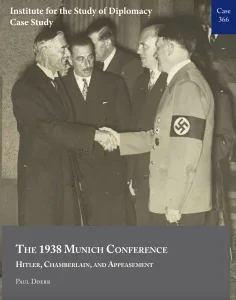Paul Doerr
ISBN: 978-1-56927-063-9 | Published: 2024
Faculty can access copies of all case studies for free via our Faculty Lounge.

This case explores contentious debates surrounding the years preceding the outbreak of World War II in Europe. It closely tracks diplomatic machinations between allied powers and Hitler’s Germany as well as domestic political forces that shaped the most controversial 20th-century foreign policy: Appeasement.
The Munich conference allows students to explore counterfactual history along a number of lines. Should Britain have “stood up” to Hitler before 1939? If so, how? What alternatives were open to the British prior to Munich? In this case, students also explore the constraints under which diplomats and politicians act. Given the economic, strategic and military conditions that Britain faced in the 1930s, how much freedom of action did the British really have? How much of what happened at Munich was pre-conditioned? Students could debate historian Paul Kennedy’s assertion that appeasement was “massively over-determined.” As well, questions of democratic powers confronting dictatorships can also be explored. What “lessons,” if any, can we learn from the Munich conference and its fallout? Students could investigate the mindset of Chamberlain. Was he buying time for rearmament, or did he hope to avoid war altogether? Can any “lessons” from Munich be applied to the current situation in Eastern Europe?